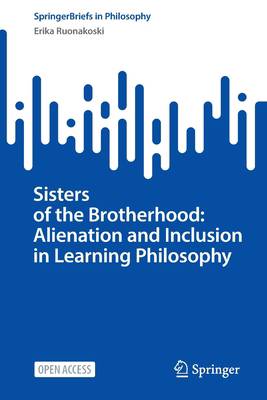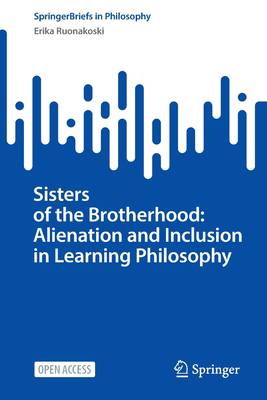
En raison d'une grêve chez bpost, votre commande pourrait être retardée. Vous avez besoin d’un livre rapidement ? Nos magasins vous accueillent à bras ouverts !
- Retrait gratuit dans votre magasin Club
- 7.000.000 titres dans notre catalogue
- Payer en toute sécurité
- Toujours un magasin près de chez vous
En raison de la grêve chez bpost, votre commande pourrait être retardée. Vous avez besoin d’un livre rapidement ? Nos magasins vous accueillent à bras ouverts !
- Retrait gratuit dans votre magasin Club
- 7.000.0000 titres dans notre catalogue
- Payer en toute sécurité
- Toujours un magasin près de chez vous
Sisters of the Brotherhood: Alienation and Inclusion in Learning Philosophy
Erika Ruonakoski
31,95 €
+ 63 points
Description
This open access book explores the gendered reality of learning philosophy at the university level, investigating the ways in which women and minority students become alienated from the social practices of a male-dominated field, and examining pedagogical solutions to this problem. It covers the roles and the interactions of the professor and student in the following ways: (1) the historical situation, (2) the affective, social and bodily situation, and (3) the moral situation.
This text analyzes women's passion for philosophy as a quest for truth, as well as their partial alienation from the social practices of philosophy. It demonstrates that recognition, generosity, and care are central ingredients of good learning and teaching experiences. Providing case studies of experimental courses in philosophy, the book discusses a variety of pedagogical approaches that might increase the inclusiveness of a philosophical education: novel and more gender-balanced ways of interpreting the history of philosophy, problem-based learning as a means of emancipating the student from the traditional master-disciple relationship, body awareness practices as a way of challenging the "disembodying" tendencies of philosophy, and a pluralism of methods to address the needs of different kinds of learners. Thanks to these features, the book is particularly useful for philosophy professors at the university level, but it also provides insights for all readers who feel puzzled about the persistent underrepresentation of women in philosophy.Spécifications
Parties prenantes
- Auteur(s) :
- Editeur:
Contenu
- Nombre de pages :
- 97
- Langue:
- Anglais
- Collection :
Caractéristiques
- EAN:
- 9783031166693
- Date de parution :
- 02-01-23
- Format:
- Livre broché
- Format numérique:
- Trade paperback (VS)
- Dimensions :
- 156 mm x 234 mm
- Poids :
- 167 g

Les avis
Nous publions uniquement les avis qui respectent les conditions requises. Consultez nos conditions pour les avis.






